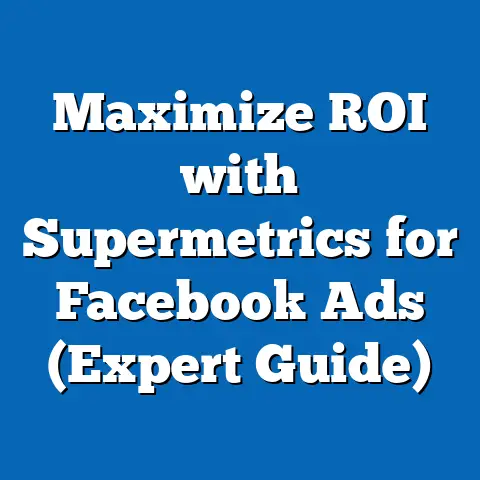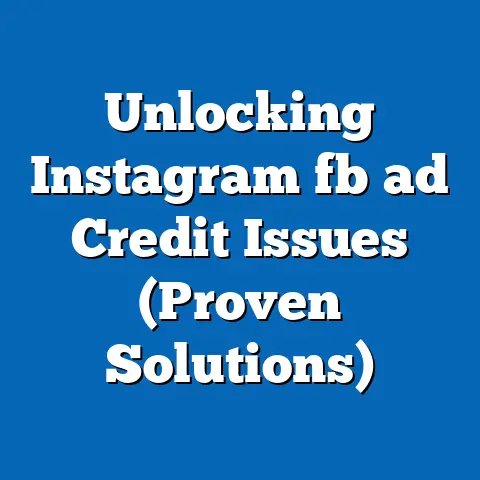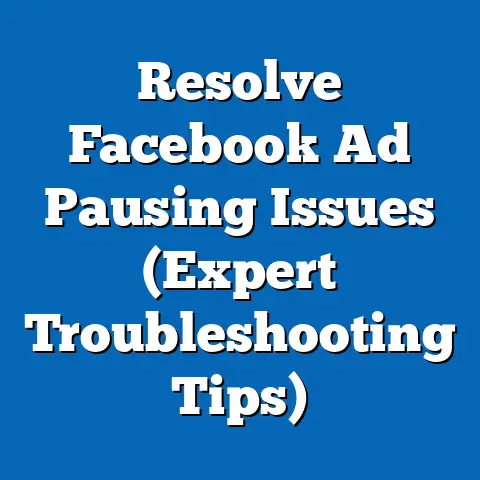How Long Does Facebook Take to Review Ads? (Essential Insights)
Over 2.8 billion people use Facebook each month, making it one of the most potent platforms for advertisers.
As someone who’s spent years navigating the ever-changing world of Facebook Ads, I know how crucial it is to get your ads up and running quickly.
But there’s always that looming question: “How long will Facebook take to review my ad?” It’s a question I’ve asked myself countless times, especially when launching time-sensitive campaigns.
In this article, I’ll share my insights on the Facebook ad review process, typical timelines, factors affecting review times, and what you can do to ensure a smoother experience.
Understanding the Facebook Ad Review Process
The Facebook ad review process is a critical step that every ad goes through before it’s shown to users.
It’s essentially Facebook’s way of ensuring that all advertising content aligns with its advertising policies and community standards.
I like to think of it as Facebook’s attempt to keep the platform a safe and enjoyable space for everyone.
The purpose of this review is multifaceted.
First and foremost, it’s about protecting users from misleading, offensive, or inappropriate content.
Facebook wants to ensure that ads are transparent, honest, and respectful.
Secondly, the review process helps maintain the integrity of the platform itself.
By enforcing its policies, Facebook aims to prevent fraudulent activities and maintain a trustworthy advertising environment.
The types of ads that require review are all-encompassing.
Whether you’re running a simple image ad or a complex video campaign, every single ad creative, targeting selection, and landing page is scrutinized.
The criteria they are evaluated against include:
- Content: Is the ad content accurate, truthful, and non-misleading?
Does it comply with Facebook’s guidelines on prohibited content, such as hate speech, violence, or discrimination? - Targeting: Are the targeting options used in a way that respects user privacy and avoids discriminatory practices?
- Format: Does the ad format adhere to Facebook’s specifications and guidelines?
Is it visually appealing and user-friendly?
From my experience, understanding these criteria is the first step in creating ads that are more likely to be approved quickly.
Key Takeaway: Familiarize yourself with Facebook’s advertising policies and community standards before creating your ads.
This will save you time and frustration in the long run.
Standard Review Time
So, how long does Facebook typically take to review ads?
This is the million-dollar question, and unfortunately, there’s no definitive answer.
In my experience, the review process generally takes anywhere from a few minutes to 24 hours.
I’ve had ads approved in as little as 15 minutes, while others have taken almost a full day.
It’s a bit of a gamble, to be honest.
However, it’s essential to understand that the timeframe can vary depending on several factors.
Peak times or events can significantly affect the review process.
For example, during holidays like Black Friday or Cyber Monday, or around major product launches, Facebook’s ad review team is often inundated with submissions.
This increased volume can lead to longer review times.
I’ve personally experienced delays of up to 48 hours during these periods, which can be incredibly frustrating when you’re trying to capitalize on seasonal opportunities.
Other factors that can influence the speed of the review process include:
- Ad Complexity: More complex ads, such as those with intricate animations or interactive elements, may require more time to review.
- Changes in Facebook Policies: When Facebook updates its advertising policies, the review process may become more rigorous as the platform adjusts to the new guidelines.
- Account Standing: If your ad account has a history of policy violations, your ads may be subject to closer scrutiny, leading to longer review times.
Key Takeaway: Plan your ad campaigns well in advance, especially during peak seasons or when launching complex ads.
This will give Facebook enough time to review your ads without disrupting your marketing schedule.
Factors Affecting Review Times
While the standard review time provides a general guideline, several factors can significantly impact how long Facebook takes to approve your ads.
Understanding these factors is crucial for managing your expectations and optimizing your ad submission process.
Content Sensitivity
One of the most significant factors affecting review times is the sensitivity of your ad content.
Ads related to certain topics, such as health, finance, or politics, often undergo a more stringent review process.
This is because Facebook wants to ensure that these ads are accurate, transparent, and do not exploit vulnerable populations.
For example, if you’re advertising a medical product or service, Facebook may require you to provide additional documentation to verify the claims made in your ad.
Similarly, ads related to financial services, such as loans or investments, may be subject to stricter scrutiny to prevent misleading or fraudulent offers.
From my experience, it’s always best to err on the side of caution when advertising sensitive content.
Make sure your ads are fully compliant with Facebook’s policies and provide any necessary documentation upfront.
This can help expedite the review process and avoid unnecessary delays.
Ad Volume
Another factor that can impact review times is the volume of ads submitted during a particular period.
As I mentioned earlier, peak seasons like holidays or product launches often result in a surge of ad submissions.
This can overwhelm Facebook’s ad review team and lead to longer processing times.
In addition, if you’re running multiple ad campaigns simultaneously, the sheer volume of ads in your account can also affect review times.
Facebook may prioritize reviewing ads from accounts with fewer submissions, especially if those accounts have a good track record of policy compliance.
To mitigate the impact of ad volume on review times, I recommend staggering your ad submissions and avoiding launching multiple campaigns at once.
This will help distribute the workload and increase the chances of your ads being reviewed promptly.
New Advertisers
If you’re a new advertiser on Facebook, you may experience longer review times compared to more established accounts.
This is because Facebook needs to build trust and verify the legitimacy of your business.
New accounts may be subject to increased scrutiny to prevent fraudulent activities and ensure compliance with advertising policies.
To build trust with Facebook, I recommend starting with simple, straightforward ads that are clearly compliant with the platform’s policies.
Avoid making bold claims or using controversial content, as this may raise red flags and trigger a more thorough review.
Additionally, make sure your business information is accurate and up-to-date in your Facebook Business Manager account.
This includes your business name, address, phone number, and website.
Providing complete and accurate information can help expedite the review process and establish your credibility as an advertiser.
Key Takeaway: Be mindful of content sensitivity, ad volume, and your account’s history when submitting ads.
These factors can significantly impact review times.
What Happens During the Review?
The Facebook ad review process is a multi-layered system that combines both artificial intelligence (AI) and human reviewers to evaluate ads.
It’s not just a simple check; it’s a thorough examination designed to ensure compliance and protect users.
During the review, Facebook’s AI algorithms analyze various aspects of your ad, including:
- Text: The ad copy, headline, and call-to-action are scanned for potentially offensive or misleading language.
- Images and Videos: Visual content is analyzed for policy violations, such as nudity, violence, or hate speech.
- Landing Page: The destination URL is checked to ensure it aligns with the ad content and doesn’t contain malicious software or deceptive practices.
- Targeting: The audience targeting options are evaluated to ensure they comply with Facebook’s non-discrimination policies.
The AI system is trained to identify common policy violations and flag ads that may require further review.
This helps speed up the process for ads that are straightforward and policy-compliant.
However, if the AI system detects any potential issues, the ad is then escalated to a human reviewer for a more in-depth assessment.
Human reviewers play a crucial role in the ad review process.
They have the expertise to interpret the nuances of language and context, which can be challenging for AI algorithms.
Human reviewers can also assess the overall quality and relevance of the ad to ensure it provides a positive user experience.
From my experience, the combination of AI and human reviewers allows Facebook to maintain a high level of accuracy and consistency in its ad review process.
However, it’s not a perfect system, and errors can sometimes occur.
That’s why it’s essential to understand your rights as an advertiser and know how to appeal a rejected ad if you believe it was unfairly flagged.
Key Takeaway: Facebook’s ad review process involves both AI and human reviewers.
Understanding how the system works can help you create ads that are more likely to be approved quickly.
Consequences of Delays
While waiting for your ads to be reviewed might seem like a minor inconvenience, delays can have significant consequences for advertisers.
It’s a lesson I’ve learned the hard way over the years.
One of the most immediate impacts of delays is on campaign timelines.
If your ads take longer to be approved, you may miss critical deadlines or opportunities.
This can be particularly problematic for time-sensitive promotions, such as holiday sales or product launches.
For example, imagine you’re launching a flash sale that’s only valid for 24 hours.
If your ads are delayed in the review process, you may miss a significant portion of the sale period, resulting in lost revenue and wasted advertising spend.
Delays can also disrupt your overall marketing strategy.
If your ads are not running as planned, you may need to adjust your budget, targeting, or creative to compensate for the lost time.
This can be a time-consuming and frustrating process, especially if you’re managing multiple campaigns simultaneously.
I’ve personally experienced situations where ad delays caused me to miss key performance indicators (KPIs) and fall short of my marketing goals.
In one instance, a delayed ad campaign resulted in a 20% decrease in website traffic and a 15% drop in sales.
It was a painful reminder of the importance of planning ahead and minimizing the risk of ad review delays.
Key Takeaway: Ad review delays can have significant consequences for your campaign timelines, marketing strategies, and overall business goals.
How to Monitor Ad Status
Fortunately, Facebook provides tools to help you monitor the status of your ads during the review process.
This allows you to stay informed and take action if necessary.
The primary place to check the status of your ads is in the Facebook Ads Manager.
Here’s how to find it:
- Log in to your Facebook Ads Manager account.
- Navigate to the “Ads” tab.
- Look for the “Delivery” column.
The “Delivery” column will display the current status of your ad. Common statuses include:
- In Review: Your ad is currently being reviewed by Facebook.
- Active: Your ad has been approved and is running.
- Not Delivering: Your ad is not currently running due to a policy violation, low budget, or other issues.
- Completed: Your ad campaign has ended.
If your ad is “In Review” for an extended period, you may want to contact Facebook’s support team for assistance.
However, before reaching out, make sure you’ve waited at least 24 hours, as this is the typical review timeframe.
To contact Facebook’s support team, you can use the “Help” button in the Ads Manager.
This will take you to a page where you can search for answers to common questions or submit a support request.
In my experience, prompt communication with Facebook’s support team can sometimes help expedite the review process.
However, it’s essential to be patient and respectful when communicating with support representatives.
They are often dealing with a high volume of requests, and being polite and professional will increase the chances of a positive outcome.
Key Takeaway: Regularly monitor the status of your ads in the Facebook Ads Manager.
If your ads are “In Review” for an extended period, consider contacting Facebook’s support team for assistance.
Understanding Rejections and Appeals
Unfortunately, ad rejections are a common occurrence in the world of Facebook advertising.
It’s happened to me countless times, and it’s something that every advertiser needs to be prepared for.
There are many reasons why an ad might be rejected.
Some of the most common include:
- Policy Violations: The ad content violates Facebook’s advertising policies, such as promoting prohibited products or services, using misleading claims, or containing offensive language.
- Incorrect Targeting: The ad’s targeting options violate Facebook’s non-discrimination policies or target audiences in an inappropriate manner.
- Poor Quality: The ad creative is of low quality, such as blurry images or poorly written text.
- Technical Issues: The ad contains technical errors, such as broken links or incorrect formatting.
When an ad is rejected, it can impact review times in several ways.
First, the rejected ad will need to be revised and resubmitted, which means it will go back to the beginning of the review process.
This can add significant delays to your campaign timeline.
Second, repeated ad rejections can damage your account’s reputation.
If your account has a history of policy violations, Facebook may subject your ads to closer scrutiny, leading to longer review times and a higher risk of future rejections.
If you believe your ad was unfairly rejected, you have the right to appeal the decision.
To appeal a rejected ad, follow these steps:
- Log in to your Facebook Ads Manager account.
- Navigate to the “Ads” tab.
- Find the rejected ad and click on the “Appeal” button.
- Provide a clear and concise explanation of why you believe the ad should be approved.
- Submit the appeal.
The typical timeframe for resolving an appeal can vary, but it generally takes between 24 and 48 hours.
During this time, Facebook will review your appeal and make a final decision.
To avoid common pitfalls that lead to ad rejections, I recommend taking the following steps:
- Carefully review Facebook’s advertising policies before creating your ads.
- Use high-quality creative that is visually appealing and relevant to your target audience.
- Write clear and concise ad copy that accurately reflects your product or service.
- Avoid making bold claims or using controversial content.
- Test your ads thoroughly before submitting them for review.
Key Takeaway: Ad rejections are a common occurrence, but understanding the reasons for rejections and knowing how to appeal can help minimize delays.
Conclusion
Understanding how long Facebook takes to review ads is essential for successful advertising on the platform.
While there’s no guaranteed timeframe, the review process typically takes between a few minutes and 24 hours.
Factors like content sensitivity, ad volume, and account history can impact review times.
As I’ve shared through my experiences, being patient yet proactive in managing your ad campaigns is crucial, especially during peak periods or with sensitive content.
Remember, a well-prepared ad submission can facilitate a smoother review process and enhance overall advertising effectiveness on the platform.
By following the tips and best practices outlined in this article, you can minimize delays, avoid ad rejections, and maximize your advertising ROI on Facebook.






